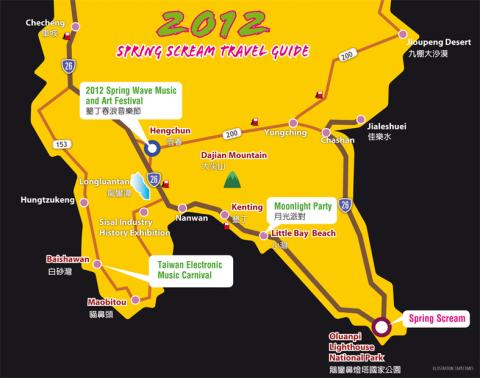Spring Scream (春天吶喊) is held at Oluanpi Lighthouse National Park (鵝鑾鼻燈塔國家公園).
GETTING THERE
For chartered buses to Spring Scream from Taipei, check www.kitravel.com.tw/servlet/springscream.bus. The Spring Scream bus operated by Kitravel runs from the front of Roxy Rocker at 177, Heping E Rd Sec 1, Taipei City (台北市和平東路一段177號), tel: (02) 2351-8177, to Oluanpi. As of press time, there were still seats left on buses leaving at 1am on April 4, April 5, April 6 and April 7, but they are selling fast so book as soon as possible. The trip is about eight hours. Tickets are NT$1,100 one-way or NT$2,000 roundtrip.

GRAPHIC: TT
Other bus companies run regular services to Kenting via Kaohsiung. Contact them directly or through Taipei Bus Station (www.taipeibus.com.tw, or by calling (02) 7733-5888).
A quicker (but more expensive) way of getting there is to take the Taiwan High Speed Rail (www.thsrc.com.tw, tel: (02) 6626-8000) to Kaohsiung’s Zuoying Station (高鐵左營車站). The total travel time is approximately 90 minutes from Taipei. Reserving your HSR tickets in advance by telephone or online is highly recommended because weekend trains often sell out.
After arriving in Zuoying, board the No. 88 bus to Kenting and make sure to ask the driver to take you to Oluanpi Lighthouse. You can also share a taxi with up to three other people to the Spring Scream site for about NT$1,600 to NT$2,000 (bargaining is an option).
The Taiwan Railway Administration (www.railway.gov.tw/en/index/index.aspx, tel: (02) 2381-5226) operates train services to Kaohsiung from Taipei. Buses run from Kaohsiung to Kenting from both Kaohsiung Train and Zuoying stations. Make your bookings as soon as possible.
The short trip from Kenting to Oluanpi takes about 15 minutes and you can travel by taxi or catch the Spring Scream shuttle bus that operates throughout the day.
As this is a holiday weekend, expect heavy traffic. The short trip to Oluanpi from Hengchun (恆春) can take more than three hours. Spring Scream organizers recommend an alternative route: Start east of Hengchun and pass along Ciaotou Road (橋頭路, Route 200) and Jiao Highway (佳鵝公路). See the “get here” section of the festival’s Web site for a map.
ACCOMMODATION
Camping at the Spring Scream site is available from April 4 to April 8 for Spring Scream ticket holders and performers only. The camping fee is NT$1,000 per tent (a maximum of six people). Places cannot be reserved in advance and are first come, first served (though there are other campsites nearby just in case). If your tent and camping gear exceeds 3m by 3m, you must pay the camping fee for two areas. The campground has running water, solar-powered hot showers and toilets.
Other campsites are located alongside the road between Kenting and Oluanpi and charge around NT$100 to NT$200 per person per night.

Behind a car repair business on a nondescript Thai street are the cherished pets of a rising TikTok animal influencer: two lions and a 200-kilogram lion-tiger hybrid called “Big George.” Lion ownership is legal in Thailand, and Tharnuwarht Plengkemratch is an enthusiastic advocate, posting updates on his feline companions to nearly three million followers. “They’re playful and affectionate, just like dogs or cats,” he said from inside their cage complex at his home in the northern city of Chiang Mai. Thailand’s captive lion population has exploded in recent years, with nearly 500 registered in zoos, breeding farms, petting cafes and homes. Experts warn the

No one saw it coming. Everyone — including the Chinese Nationalist Party (KMT) — expected at least some of the recall campaigns against 24 of its lawmakers and Hsinchu Mayor Ann Kao (高虹安) to succeed. Underground gamblers reportedly expected between five and eight lawmakers to lose their jobs. All of this analysis made sense, but contained a fatal flaw. The record of the recall campaigns, the collapse of the KMT-led recalls, and polling data all pointed to enthusiastic high turnout in support of the recall campaigns, and that those against the recalls were unenthusiastic and far less likely to vote. That

The unexpected collapse of the recall campaigns is being viewed through many lenses, most of them skewed and self-absorbed. The international media unsurprisingly focuses on what they perceive as the message that Taiwanese voters were sending in the failure of the mass recall, especially to China, the US and to friendly Western nations. This made some sense prior to early last month. One of the main arguments used by recall campaigners for recalling Chinese Nationalist Party (KMT) lawmakers was that they were too pro-China, and by extension not to be trusted with defending the nation. Also by extension, that argument could be

The centuries-old fiery Chinese spirit baijiu (白酒), long associated with business dinners, is being reshaped to appeal to younger generations as its makers adapt to changing times. Mostly distilled from sorghum, the clear but pungent liquor contains as much as 60 percent alcohol. It’s the usual choice for toasts of gan bei (乾杯), the Chinese expression for bottoms up, and raucous drinking games. “If you like to drink spirits and you’ve never had baijiu, it’s kind of like eating noodles but you’ve never had spaghetti,” said Jim Boyce, a Canadian writer and wine expert who founded World Baijiu Day a decade